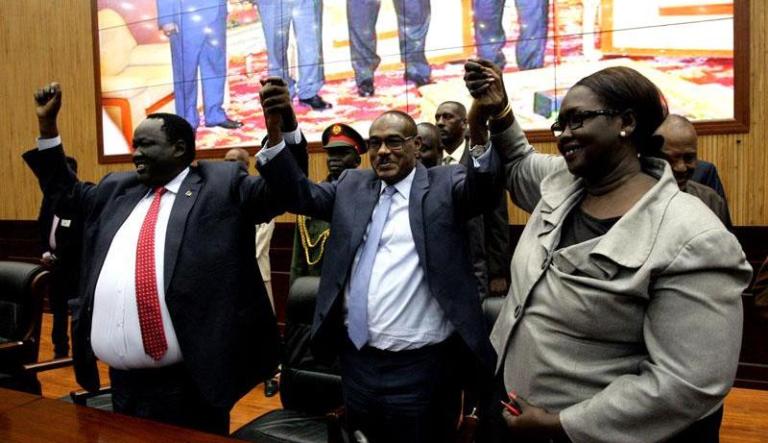South Sudan government, SPLM-IO initial governance agreement

June 25, 2018 (KHARTOUM) – South Sudanese government and SPLM-IO initialled power-sharing and governance agreement on Wednesday while other political opposition groups rejected the deal pointing that it didn’t resolve the issue of the 32 states established in violation of the 2015 peace pact.
As the discussions were recently focused on the issue of the states, on Wednesday morning, the Sudanese mediators released a new proposal maintaining the power-sharing at the local government level despite Juba opposition and providing to hold a referendum if the parties fail to reach an agreement over the fate of the 32 states at the level of the Independent Boundaries Commission.
The signing ceremony was attended by the government negotiating delegation including senior ministers, and the Riek Machar who avoided to issue any public statement during the negotiations unlike the other opposition or the government delegations.
Sudanese foreign minister who endorsed the role of chief mediator announced in his speech at the initialling ceremony that final signing ceremony will take place on 5 August 2018 in the presence of the IGAD leaders.
El- Dirdeiry Mohamed Ahmed further reiterated Sudan’s keenness to continue its efforts to bring the holdout groups to join the agreement.
According to the agreement which is the last issue of contention in the peace revitalization process the transitional government, tasked with the implementation of the peace agreement, will be composed of 35 ministers. The incumbent government will get 20 ministers, SPLM-IO 9 ministers, SSOA 3 ministers, FDs 2 ministers and OPP one minister.
Machar will be reinstated as First Vice President, and with him, there will be four other vice-presidents. All of them they will form a collegial presidency with President Salva Kiir to deliver the content of the peace agreement and achieve democratic and institutional reforms during the 30-month transitional period.
The Parliament will consist of 550 parliamentarians with 332 members from Kiir’s government, 128 from Machar’s group, 50 members from SSOA, 30 members from OPP and 10 members from FDs.
The political opposition groups which rejected the military action during the nearly past five years believe the current percentage of representation will deprive them of playing an important role during the transitional period. It is not clear now which role they can play during the transitional period.
Observers in Juba say SSOA- FDs’s rejection may weaken Machar position during the transitional period. But an opposition leader stated to Sudan Tribune under the cover of anonymity that they will be free from any constraints and act as an initial sounding-board to explain their ideas.
ENOUGH WELCOMES THE DEAL
Rights advocacy group Enough Project welcomed the initialling of the power-sharing deal in Khartoum but stressed on the need for an inclusive peace and achieve the needed reform for the sake of peace and democracy in the new nation.
“The narrowing of the gaps between the primary warring parties in the South Sudanese conflict is welcome news. However, an inclusive peace is the only peace that will ever be sustainable,” said John Prendergast, Founding Director of the Enough Project and Co-Founder of The Sentry.
for his part, Brian Adeba, an Enough Deputy Director of Policy pointed to the need to avoid concentration of power in few hands to avoid a return of war.
“The contentious issue of state borders requires the utmost independence and impartiality in its management to deter political machinations that favour one side” he further added.
(ST)
